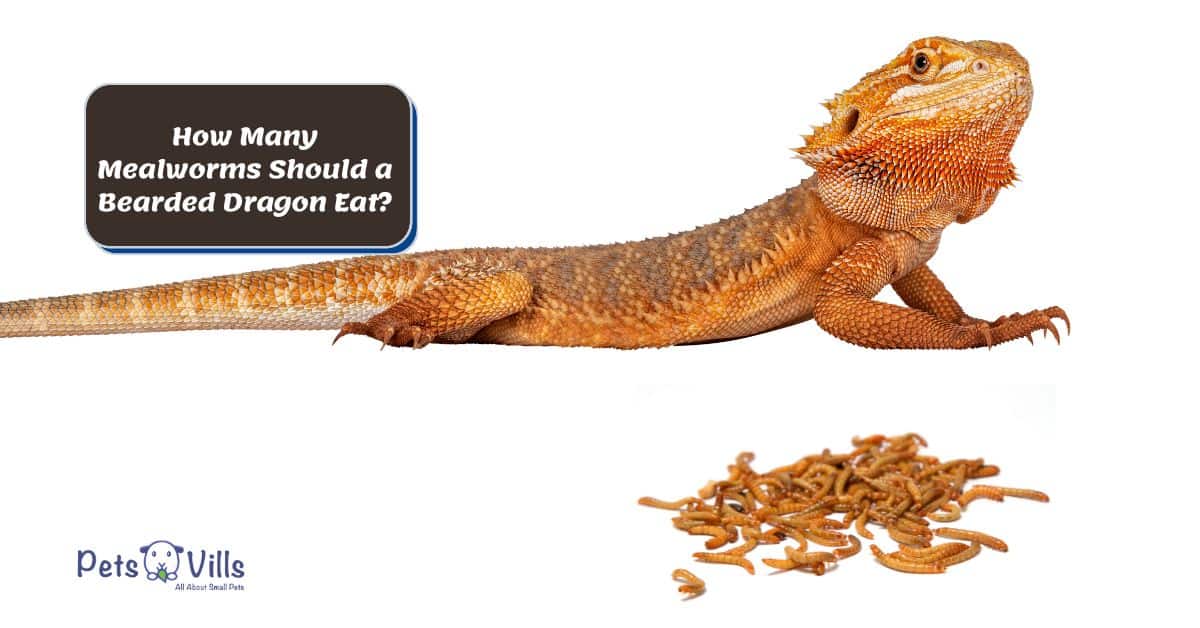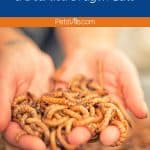Last week, I was thinking about my pet’s diet, and this struck my mind, “how many mealworms to feed a bearded dragon?”
Since I got a bearded dragon, Bobby, I haven’t settled on his balanced diet.
So I decided to end the trial and error diet by seeking help from a local reptile expert.
This guide shines a light on bearded dragon owners wondering if mealworms are suitable for their pets.
This post contains affiliate links. We earn a commission if you make a purchase after clicking on our links.
Don’t have time? Check this comparison table of our top faves!
Table of Contents
Can Bearded Dragons Eat Mealworms?
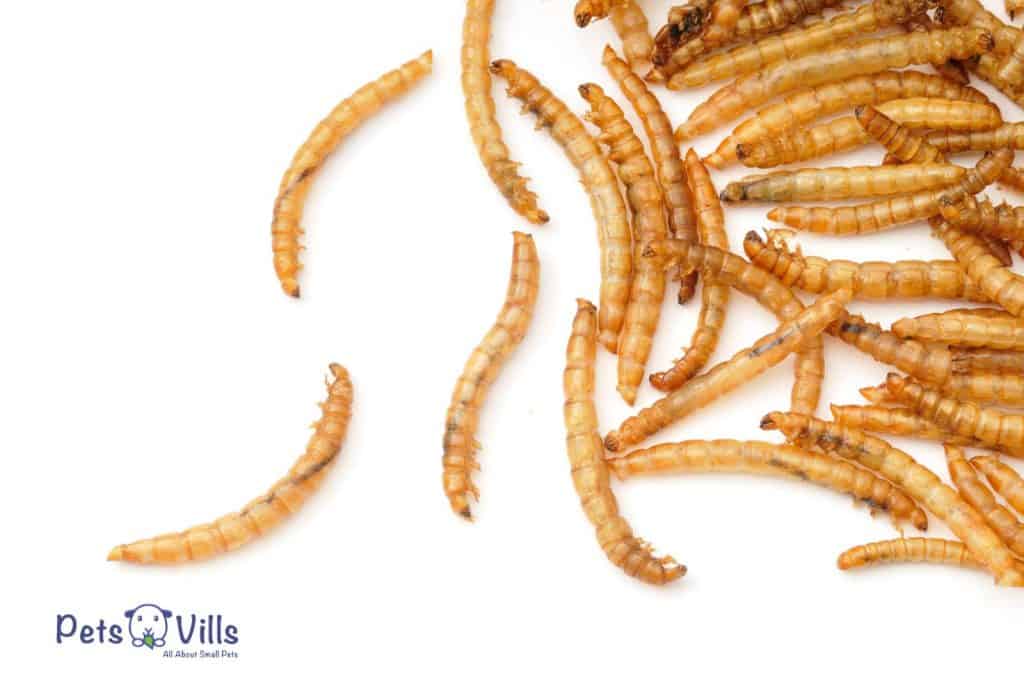
Bearded dragons love the taste of mealworms since these insects are one of their staple foods in the wild. Moreover, these popular feeder insects are high in protein and offer a good treat.
You can either feed live or freeze-dried mealworms as an occasional treat. This is because these insects have the nutrition content that beardies need.
But can bearded dragons eat night crawler worms? There is confusion when referring to night crawlers since they resemble earthworms.
However, the two are different, and in our case, you can only feed your beardie nightcrawlers bought from online dealers, breeders, or pet shops.
Never feed any garden-caught insects to your pet lizards since they may contain parasites and pesticides.
Check out this video of bearded dragon diet expenses you need to know.
Can Baby Bearded Dragons Eat Mealworms?
No, while baby dragons’ diet should include 80% insects and 20% vegetables, mealworms are not the perfect meal for them. These insects have a hard chitinous exoskeleton that your beardie cannot digest.
Moreover, baby beardies are timid hunters and can be overwhelmed when trying to feed on a wriggling mealworm. Also, note that mealworms have a strong bite that can affect your baby lizard.
The high phosphorus, fat content, and potential to cause intestinal blockages make mealworms suitable only as an occasional treat.
Here is a YouTube video from Lord Elion on why it is not advisable to feed mealworms to your baby dragon.
Can Bearded Dragons Eat Dead Mealworms?
If the mealworms die, throw them into the trash can. This is because they have lost their nutritional profile and will not benefit your bearded dragon.
Moreover, the moisture content will have dried, making them hard for your dragon to digest. In such cases, it is better to ask what insects do bearded dragons eat so you can find alternative feeder options. (1)
Can Bearded Dragons Eat Mealworms Beetles?
Yes, you can feed your beardie mealworm beetles in moderation. These beetles come after mealworm metamorphosis when kept at room temperature.
The mealworm beetles are low in fat and high in protein and are the perfect treat. The best feeding schedule to follow is giving 5-6 mealworms per week, and if the dragon does not like the taste of mealworm beetles, avoid force-feeding.
Are Mealworms Good for Bearded Dragons? 5 Benefits Explained
If asked whether mealworms are good for bearded dragons, the answer is yes. These feeder insects have various benefits in supplementing a dragon’s diet.
Here is a table highlighting the nutritional composition of mealworms.
| Nutrient | Value |
| Calcium | 13.33 mg |
| Protein | 20% |
| Fat | 13% |
| Moisture | 62% |
| Cholesterol | 150 mg |
Here are some benefits explained.
1- Excellent Fat Content
Mealworms have higher fat content, which helps the pet produce energy. However, you should not overfeed your beardie since this can lead to obesity.
On the other hand, if your dragon diet does not include fat, the reptile can develop weight issues and lack an active lifestyle. The trick here is to balance the feeding so your pet can have the fat-content benefits.
2- High Protein Level
As highlighted above, bearded dragon food includes 80% insects and 20% vegetables at one stage of their life. This is especially the baby stage since insects are rich in protein, essential in bone health and development.
Mealworms that fall under the insects class are an excellent option to give your pet the bone strength and development needed.
Keep in mind that the health and appearance of an adult beardie depend on how well they are raised, hence the need for a protein-rich diet.
3- High Moisture Content
Mealworms pack 62% moisture content to give your animal companion the perfect hydration. Moreover, note that the Pogona Viticepps survive in arid climates and can survive without regular amounts of water.
However, these reptiles are dependent on the moisture content from vegetables and insects. So this makes the mealworms a perfect hydration insect to feed our bearded dragon.
4- Perfect Calcium Source
Dietary calcium is essential to the growth of your pet. If the animal lacks or experiences poor calcium absorption, it will likely suffer from diseases like Metabolic Bone Disease (MBD). (2)
And since mealworms pack 13.33 mg of calcium, these insects are the best option to provide this health supplement.
However, note this amount is not enough, so you must boost the supplement to avoid calcium deficiency.
You can buy calcium carbonate tablets and grind them into powder. Before feeding your beardie, ensure to sprinkle the calcium dust on the mealworms.
5- Quiet Staple Insects
Most bearded dragon owners will love the mealworms for their silence. I have to admit the crickets I had bought became a nuisance at dusk with all the noises they made.
Moreover, mealworms are not smelly and will not escape from the shallow bowl you feed your pet on. Their active nature also arouses the beardie’s hunting instincts, and they will love pouncing on the insects.
And if you are wondering, ”are hornworms good for bearded dragons?” yes, they are. They are another silent feeder insect you can opt for if you do not want to feed mealworms.
A Youtube video from Surprise Eggs and Toy Fun shows how bearded dragons are fond of hornworms.
How Many Mealworms Should a Bearded Dragon Eat?
While the above benefits highlight reasons you should feed your dragon this tasty treat, there are limitations. So, how many mealworms to feed a bearded dragon?
Ideally, treat mealworms as a supplement and not the main meal. And with that said, feed your adult beardies 5-6 mealworms, and for baby beardies, feed 1-2 at least once or twice weekly.
How Often Should I Feed My Bearded Dragon Mealworms?
As highlighted above, this is a treat and not the main course to feed your dragon daily. Ideally, you should find the best dry food for bearded dragons to serve your scaly friend.
Here is a breakdown of how to feed mealworms according to the age of beardies.
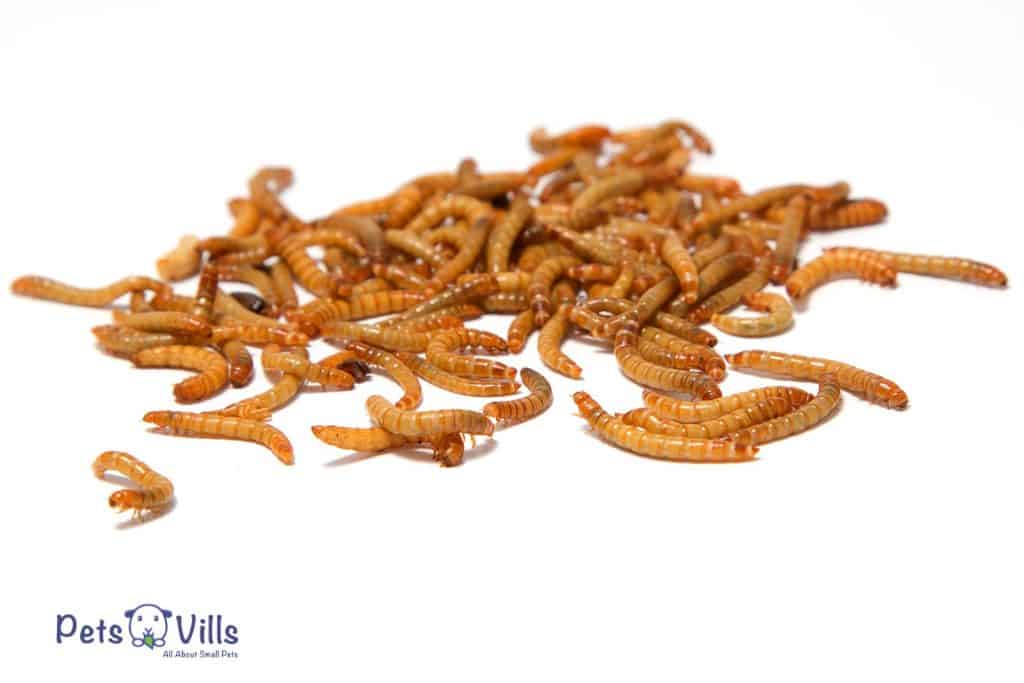
Baby Bearded Dragon
Since a baby lizard has no fully developed digestive system, avoid giving them mealworms. The chitin coating found in mealworms will only result in health issues warranting a visit to the vet.
However, when the dragon hits the juvenile stage, you can feed them one or two baby mealworms weekly.
Ideally, wait until the pet is eight months old to feed them their first mealworm. Also, keep away from adult mealworms since these will be harder to digest.
Adult Bearded Dragon
Adult reptiles can freely eat this special treat since they have a fully developed digestive system. However, consider mealworms as a supplement to staple insects for their poor calcium to phosphorus ratio.
Remember that excessive mealworm consumption cannot make up for the balanced diet needs. Unfortunately, this action will only lead to obesity and fatty liver disease. (3)
However, you can entice your pregnant beardie to these favorite treats. And if your pet has a loss of appetite, consider checking for
- Signs of stress
- Parasites
- Brumation
- Health issues
- The enclosure’s temperature
If necessary, seek help from a reptile expert.
Can Bearded Dragons Eat Mealworms Every Day?
No, it is not advisable to feed your pet mealworms each day. While these insects are an excellent source of protein when paired with green vegetables, look for other daily alternatives like Dubia roaches and crickets.
An adult bearded dragon will be better off with a diet of 5-6 mealworms, and baby reptiles can do one or two per week. This limited number should grant your beardie healthy bone mass, fewer digestive issues, and happy life.
FAQ
At what age can bearded dragons eat mealworms?
The juvenile stage is the ideal age to start feeding your bearded dragon mealworms. This stage is usually achieved when the pet reaches 5-18 months of age.
Are wax worms better than mealworms for bearded dragons?
Yes, waxworms are better than mealworms since they have a higher calcium content, 28.3%, compared to the mealworm’s 13.3%. However, wax worms have a higher fat content averaging 21%, making them rare treats.
What kind of worms can bearded dragons eat?
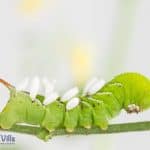
Beardies can eat mealworms, hornworms, super worms, butterworms, and silkworms.
Conclusion
There you have it, pet owners: a definitive guide on how many mealworms to feed a bearded dragon. After reading my research findings, all your questions should now have the actual answers you seek.
It is now up to you to decide if you should opt for these insect treats. And if you do, ensure you take care to avoid health concerns.
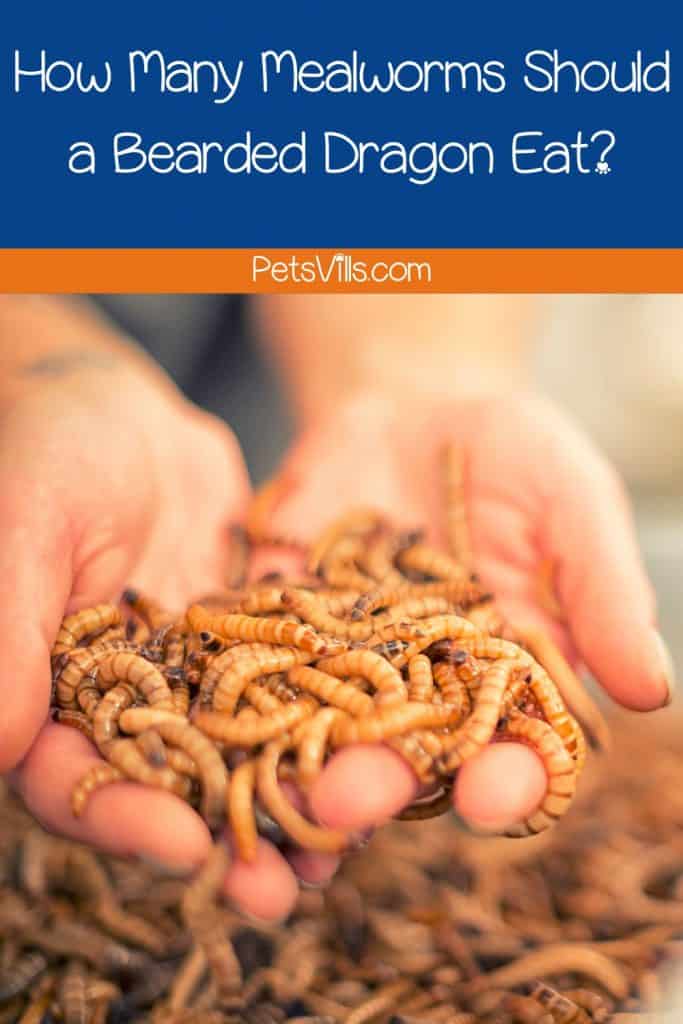
References:
1. Jess AD. What Do Bearded Dragons Eat? [Internet]. Vet Explains Pets. 2020 [cited 2022 Jul 5]. Available from: https://vetexplainspets.com/what-do-bearded-dragons-eat/
2. MBD In Bearded Dragons [Internet]. www.animalcarehospital.org. 2021. Available from: https://www.animalcarehospital.org/2021/11/1/marion-ia-mbd-in-bearded-dragons
3. Barboza T, Susta L, Reavill D, Beaufrère H. Prevalence and risk factors of hepatic lipid changes in bearded dragons (Pogona vitticeps). Veterinary Pathology [Internet]. 2022 [cited 2022 Jul 5];3009858221105058. Available from: https://pubmed.ncbi.nlm.nih.gov/35723028/
Alina Hartley is a small-town girl with a ginormous love of bearded dragons. It all started with Winchester, a baby bearded who was abandoned at the shelter by his former owners because of a birth defect that caused one front leg to be shorter than the other. Alina originally went to the shelter looking for a guinea pig, but one look at Winchester and it was love at first sight. From that day on, Alina has dedicated her life to learning everything she can about bearded dragons. She loves helping new beardie parents start their incredible journey with these magnificent reptiles.
Follow her on:
LINKEDIN
TWITTER.
Read her latest articles HERE
Learn more about her HERE.

